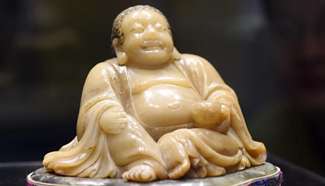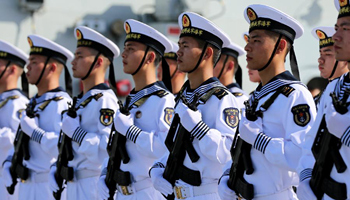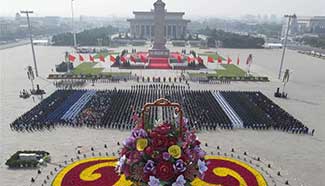By Fei Liena, Li Jie
BEIJING, Oct. 1 (Xinhua) -- The inclusion of China's renminbi (RMB) in the Special Drawing Rights (SDR) basket of the International Monetary Fund (IMF) on Oct. 1 has kickstarted the voyage of the RMB's internationalization and complementing the inherently flawed international monetary system.
THE TRIFFIN DILEMMA
For decades, the world economy has been haunted by the so-called Triffin Dilemma or Triffin Paradox, which under the existing international monetary system context featuring the U.S. dollar as the dominant global reserve currency means the United States had to keep running deficits so that the system can maintain liquidity.
However, long-term deficits could cause a devaluation of the U.S. dollar, which contradicts the prerequisite of being a steady and firm international reserve currency.
According to Li Daokui, director of the Center for China in the World Economy at Tsinghua University, the Triffin Dilemma wields its power differently in different times.
In the 1990s, for instance, the Federal Reserve (Fed) adopted the monetary tightening policy for the sake of squeezing bubbles out of its burgeoning Internet industry. As a consequence, the then economically vibrant Southeast Asian region suffered a supply shortage of U.S. dollars, leading to the Asian financial crisis in 1997.
A similar scenario has started to emerge under the current circumstances. Recovering relatively well from the last world financial crisis starting in 2008, the United States is mulling to move from the once economy-stimulating monetary easing policy to a monetary tightening policy.
However, from the world economic perspective, as the global reserve currency, the U.S. dollar should not be "tightened" at all as the global economy is still struggling to recover, and needs more liquidity support.
"The U.S. government has always been adjusting its monetary policy based on its own needs, and considers the international role of the U.S. dollar less," said Li. "As a result, the turbulence of the world economy and global financial market might exacerbate."
"That's exactly the core of the Triffin Dilemma -- the development of the world economy has surpassed the capability of a single national currency," he said.
CHINA'S PROPOSAL
In the wake of the financial crisis, Governor of the People's Bank of China Zhou Xiaochuan explicitly named the Triffin Dilemma as the root cause of the economic disorder and called for a reform of the international monetary system in March 2009.
"The outbreak of the (2008 financial) crisis and its spillover to the entire world reflect the inherent vulnerabilities and systemic risks in the existing international monetary system," said Zhou.
"The outbreak of the crisis and its spillover in the world have confronted us with a long-existing but still unanswered question, i.e., what kind of international reserve currency do we need to secure global financial stability and facilitate world economic growth?" he asked in a speech titled "Reform the International Monetary System."
As a possible solution, he proposed gradually moving away from the U.S. dollar as a single reserve currency and toward the use of the IMF's SDR as a packaged global reserve currency.
"The IMF created the SDR in 1969, when the defects of the Bretton Woods system initially emerged, to mitigate the inherent risks sovereign reserve currencies caused. Yet, the role of the SDR has not been put into full play due to limitations on its allocation and the scope of its uses," Zhou said.
He believed that efforts should be made to push forward SDR allocation and broaden its scope so as to enable the SDR to fully satisfy member countries' demand for a reserve currency.
Zhou also stressed the need to set up a settlement system between the SDR and other currencies.
Zhou's proposal has attracted worldwide attention. John Lipsky, former IMF first deputy managing director, called the idea a "serious proposal."
Group of 20 leaders in 2009 agreed to allow the IMF to allocate the SDR equivalent to 250 billion U.S. dollars to provide liquidity to the global economic system by supplementing 186 member countries' foreign exchange reserves.
The IMF echoed Zhou's proposal in a study published in April 2010, and recommended the world adopt a new global reserve currency, also called the bancor, and set up a global central bank to administer such a supranational currency.
RMB'S WORLD ADVENTURE
The IMF officially adds the RMB, the Chinese currency, to its SDR basket on Oct. 1 with a weighting of 10.92 percent, just next to the U.S. dollar's 41.73 percent and the euro's 30.93 percent, starting the currency's exciting world journey.
The inclusion of the RMB in the IMF's SDR basket, on the one hand, will enhance the currency's international credibility, benefiting countries, enterprises and individuals.
On the other hand, the inclusion of the RMB -- the only emerging market currency -- in the "world reserve" will help the flawed international currency system monopolized by the U.S. dollar to advance toward a multipolar direction, making it more stable, representative and contemporary.
"The inclusion of the RMB in the IMF's SDR basket is the starting point of a great journey," said Li. "It has great significance and is an important acknowledgement of the RMB's global role."
For a currency, to be "reserved" means it truly walks into the palace of global currency, as people always tend to reserve the "good money" for its better security, profitability and liquidity.
In May, 3 billion RMB worth of Chinese sovereign bonds were quickly snapped up by investors from Asia, Europe and Africa and attracted 8.5 billion RMB worth of subscription capital. After the successful issuance, Matthew Taylor, director of International Finance at the HM Treasury, said the country will continue to support the internationalization of the RMB.
Research from the IMF showed that a total of 38 countries currently own assets in RMB. Now, the RMB has become the second-largest currency for trade financing, the fifth-largest for international payment and the seventh-largest reserve currency in the world.
The latest report from the Bank for International Settlements said the share of the RMB's foreign exchange market turnover in global trade had nearly doubled in the past three years and daily turnover had increased to 202 billion U.S. dollars from 120 billion U.S. dollars.
Five thousand kilometers away from Beijing, Ms. Zhou, a Chinese tourist, was in agony. She was exhausted from climbing Sri Lanka's world-renowned Sigiriya Lion Rock, and her throat was parched with thirst.
Yet there seemed nothing she could do as she had no Sri Lankan rupee on her. At that moment, a local vendor shouted: "Renminbi, renminbi!" Surprised, Ms. Zhou gave him a five-yuan bill. The vendor happily accepted it, and handed her two bottles of water.
"Wow, I didn't expect my renminbi could be used here!" Ms. Zhou said.
Now, by joining the IMF's SDR basket, China's RMB is expected to travel even further. (Xinhua writers Xie Peng and Chen Shilei also contributed to the story.)










